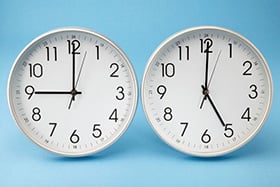How to be a better time manager

Some of us don’t seem to be able to manage our time as we want: leaving things unfinished, being late for appointments, unable to complete the household chores or simply not finding time for ourselves.
Originally, time management referred to just business or work activities, but with time being such a precious commodity in managing a work life balance then the term has been broadened to include personal activities as well.
Major principles of time management are:
- Setting out priorities
- Reducing time spent on non-priorities
- Sticking to time-related deadlines
Time management tips
Here are some tips to help you manage your time more effectively, leaving more time for you…
- Draw up a daily plan or to do list the evening before in order to plan the following day. This will provide you with an overview of how your day will pan out without getting caught off guard. Try to stick to this plan as much as possible.
- Put a time limit to each task: shopping completed by 11am, visit family by 3pm, cook dinner by 6pm, walking the dog done by 7pm, after that the time remaining is your own! These time slots prevent jobs from dragging on and eating into any time reserved for other activities. Don’t pack everything close together, leave some buffer time between each task, this will help you to wrap up one task and prepare to start the next one.
- Always have a clock to hand – sometimes we can get so engrossed in a task we lose track of time.
- Learn to say no; don’t take on more than you can handle. Manage other people’s expectations by giving them a realistic timeline: “I can’t do what you’re asking now, but how about tomorrow?” - people respond well to honesty and compromise.
- Delegate anything that can be done by others, this takes the pressure off you and allows you to concentrate on things that need your attention. Get the kids involved!
- Focus. Some of us are able to multi-task, but are we multi-tasking so much that nothing really gets done? Focus on one task at a time, we can then spend less time on one task compared to more time needed to do three things at once.

- Ignore distractions: we’re doing a job that needs our undivided attention and a text message comes in, do we stop what we’re doing and look/respond to the text message, throwing our concentration off the task in hand? Probably. Ask what takes you away from your work: Facebook? Twitter? Emails? Stop checking them so often, and make them harder to access by putting them out of arms reach.
- Try to resist short-cutting the task in hand; finish the job you’re doing, then before you start the next one block some time out in your plan to review texts or even social media.
- Don’t waste time on unimportant details, we generally don’t get things exactly the way we want it, ask yourself does it need to be exactly a certain way?
- Improve your concentration. Our mind struggles to focus if we spend eight intensive hours on tasks, so short breaks are often recommended as they allow the brain to rest before focusing again. Complete tasks that require concentration when you’re most alert and energetic, for example in the morning.
Multi-tasking

If multi-tasking can happen without losing quality, you can try to incorporate these examples:
- Watching TV: use this time to make a shopping list, pay some bills or do some ironing. Even organise an online grocery shopping order.
- Laundry: put a load on in the evening when the dinner is cooking, then fold when everyone’s eating breakfast.
- De-clutter bathroom: when you’re brushing your teeth or when the kids are in the bath, use this time to tidy things away and wipe the sides down.
- Meals: cook more than one meal at a time; if you are making a lasagne double up and make two, one can be put in the freezer.
- Errands: if you’re leaving the house to go shopping, make sure that you write a list of what you need so you can handle it all in one trip. The less you visit shops (and get everything done in one hit) the less you spend.
Motivation
We spend a lot of time procrastinating and thinking about tidying the rooms, and then look for any excuse to put it off. But try allocating 15 minutes to each room, for example:
- 15 mins – living room
- 15 mins – kitchen
- 15 mins – bathroom
- 15 mins – bedroom

As you can see, this adds up to one hour; stick to the timescale using a timer, and in the long term it will be easier to keep those rooms under control. Whilst we know that some rooms will take more than 15 minutes to organise, it is ample time to get things back in order. The deep cleaning of your rooms can be handled by one of our qualified cleaners!
Another benefit of this system is that if its allocated it doesn’t allow time for you to get side-tracked. Then after the hour reward yourself with some time to do what you want to do; you will feel good knowing that you’ve achieved something that really needed doing.
Remember, you can do quite a lot in 15 minutes, if you don’t finish a task then add it to the next hour’s list – don’t overrun. Try keeping the list in your pocket so you can cross jobs off. We’re never going to get more than 24 hours in the day, but we can achieve more if we structure those 24 hours!
Related articles:
Share this
Share this
Send to a friend